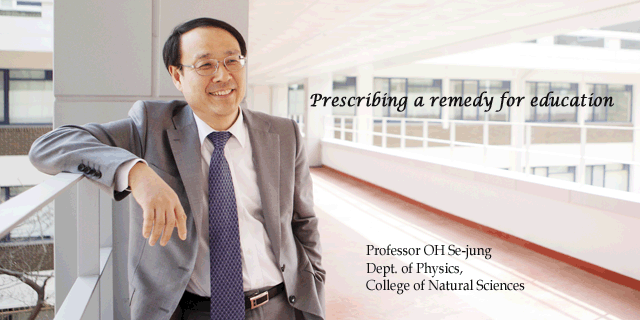
A new approach is needed in the ‘war against private education’
Private education is the hottest potato in Korea. About two months ago, the chairman of the presidential advisory committee for future planning proposed drastic measures to cut private educational expenses by banning private educational institutes from holding classes after 10 p.m., outsourcing after-school programs to for-profit institutes and restricting the weight of school grades in specialized high school admissions. His reason was that the middle class can only be saved by reducing private education costs, and he expressed a strong will to do so, saying, “I will be glad to die a glorious death on the battlefield of reform.”
The government and the ruling party have used an expression, “war against private education” and have ever since brought forward many ideas such as introducing an absolute evaluation system in middle and high schools, excluding the grades of the first year of high school from college admissions criteria and reducing the number of subjects in the College Scholastic Ability Test. In fact, each policy is a serious issue that can bring significant changes at schools, and citizens are already very confused. The entire nation is in discord as the Ministry of Education, Science and Technology, the Committee for Future Planning and the ruling party add to the confusion by producing different opinions. Of course, different policy makers can have different opinions in order to pursue greater reform, and the adverse side effects of the policy decision can be minimized and refined in the course of fine-tuning different ideas. However, the current discussion over reducing private education costs poses more fundamental problems. The first is practicality. For example, reducing the number of subjects in the College Scholastic Ability Test is based on a simple theory that mitigating the burden of the students will translated into a lesser need for private education.
However, the purpose of private education is to get ahead of other students, so opponents argue that reducing the number of subjects students are tested on will fuel the need for private tutoring, and the overall demands for private education will not change. Especially if the number of social studies and sciences topics is reduced, the so-called “core subjects” of Korean language, English and mathematics, will have more weight, and students will be tempted to focus more on these subjects through private education and tutoring. Students already tend to avoid majors such as world history, Korean history and physics because of challenging prerequisites. If the subject choices in social studies and the sciences are reduced, the trend will be aggravated, and some are concerned that the educational system will retreat to the uniform study pattern focused on Korean, English and math in the past.
Secondly, the proposals might be against the philosophy of pursuing autonomy and responsibility. The suggested measures mostly limit college and high schools’ choices, reminding Koreans of the policies of authoritarian regimes. If the evils of private education were so extreme that they might harm the social stability, the government might use an allopathic treatment.
When a patient has a fever that is too high, a doctor would prescribe a fever remedy first, regardless of the cause. However, if the doctor liberally prescribes fever medicine and does not make efforts to treat the cause of the fever, the patient and family will no longer trust the doctor. Moreover, when the effect of the medicine is unclear, the patient would be more skeptical.
Right now, the government and the ruling party’s plan to address the private education issue is allopathic. Ultimately, the education issue should be resolved by giving educational entities autonomy as well as making them accountable. The citizens cannot trust the government when it produces only impromptu, temporary measures without a long-term road map. Let’s look at the idea of introducing absolute evaluation in middle and high school grade reports. It is widely understood that the current relative evaluation has encouraged competition among students and resulted in serious educational problems, such as dampening cooperative spirit. Yet, it is also obvious that changing it to an absolute evaluation system will inflate high school grades as it did in the past. Then, colleges and universities will try to minimize the weight on high school grades in admissions, and then secondary public education will become unsubstantial again. In order to resolve the fundamental problem, colleges and high schools should be able to trust each other. Colleges will trust the student grades provided by high schools, and high schools will send objective data to colleges. Such a solution might sound like an armchair theory from an idealist. But in the 1930s in the United States, universities and high schools made a pact, after eight years of research, and established the foundation of the college admissions system they have today. There is no reason why we cannot reach a grander social consensus if all interested parties, namely colleges, universities, high schools and parents, come together and have an earnest discussion.
The government needs to scientifically prove the effect if it uses an allopathic remedy to enjoy a short-term effect. Moreover, it needs to propose and steadily pursue a long-term road map based on autonomy and accountability. Only then will Koreans have confidence in the government’s education policies.

